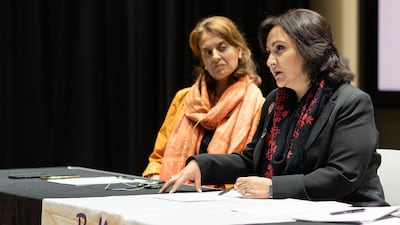Live updates: Follow the latest on Israel-Gaza
Calls are growing for more inclusive Palestinian talks, as two main parties seek to bridge deep divisions in the formation of a new government that would be accepted by the international community.
Fatah and Hamas were scheduled to meet in China in June for mediated talks as they seek to agree on how Gaza will be ruled after the war – but those talks were delayed with no new date set. Parallel initiatives have taken place both inside and outside the region as well as mediated efforts between factions.
Palestine’s growing plethora of new parties and independents fear they could be left out of such brokered negotiations, a development that could and undermine the sovereignty of Palestinian politics.
“This politics free, fat-free set-up that everybody thinks can work is a failure,” said Nour Odeh, a political analyst and founding member of the National Democratic Palestinian Assembly.
“They're saying the right things, but it is guided by outside diktats, and so it will not result in what is desired. It should be a lot more organic … inclusive,” she told The National.
The Palestinian Authority formed a technocratic government in February that sought to unify all territories after the war.
This came after pressure for reforms from the US and the international community.
While there are calls for a “unitary government” that would represent Palestinians from all political divides, the US and Israel are likely to reject any formation that includes Hamas.
Earlier meetings between the political groups in February aimed to galvanise support for the technocratic solution.
A technocratic government would be ineffective in dealing with the political realities of the Israeli occupation and leading Palestinians towards a sovereign state, she said.
“How can you talk about our water deprivation without talking about theft of water? That is one formula to ensure that the status quo continues,” she said.
“You have to have a politically informed, politically backed government that can deliver on the technical level so that the political leadership can work on, you know, the prime objective of liberation,” she said.
Palestine’s political process has been frozen since Gazans elected Hamas as their leaders in 2006 – a result which the international community rejected, prompting a civil war between Hamas and Fatah the following year.
The last scheduled legislative elections in 2021 – where Ms Odeh stood as a candidate – were postponed by the PA owing to Israel’s refusal to allow a vote from the Arab residents of Jerusalem.

The NDPA was formed in 2020 by Nasser Kidwa, Yasser Arafat’s nephew, and was part of jailed leader Marwan Barghouti’s Freedom party list in the aborted 2021 legislative elections. Ms Odeh also served as a spokeswoman for former Prime Minister Salam Fayyad.
“Nobody in the West wanted them to happen. The Europeans didn't send the observers, the diplomats were very apprehensive. They were almost certain we were going to make the wrong choice,” she said during a panel discussion at the Balfour Project conference last Thursday.
“What that did is allow Palestinian politics to completely disintegrate,” she added.
Ms Odeh said it was necessary to include an elected Hamas and Palestinian Islamic Jihad at the table in order to hold these forces – which have been strengthened by the war and are likely to survive it – accountable in government.
“We have to have all the players participate. Those that I like, and those that I don't, that is the very definition of democracy,” she said at the conference.
“I want all of them, Hamas, and Islamic Jihad and Fatah. They need to be held accountable. The only way to do that is for them to participate in political life and be accountable,” she added.
Elections should not be limited to the Palestinian Authority, which has limited powers and was formed out of the Oslo Accords, but part of a “pathway to rebuilding” the Palestinian Liberation Organisation – which represents all Palestinians.
“Palestinian renewal must reshape and remould Palestinian polity, and we cannot continue to allow the PA to morph into something that is more important in weight and in influence than the PLO, which is our collective political home as Palestinians,” she told The National.
“Reimagining and reshaping, a process that is inclusive, that involves discussion, a redrafting of what our collective goals are and how we want to present them and what we want from the world,” she said.
Though it would take at least two years from the end of the war for an election to be “technically” possible, Palestinian political groups needed to start working on it now.
“Right now, everybody's talking about what we should do and what we're entitled to, but it has to come from us,” she said.


